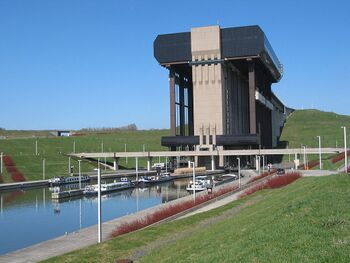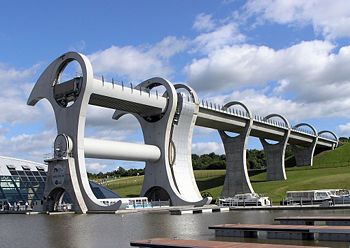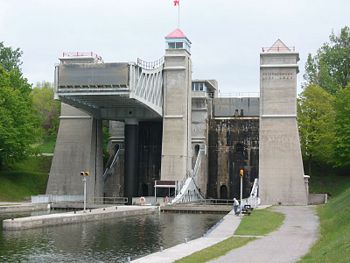Lift lock: Difference between revisions
imported>George Swan m (more details) |
mNo edit summary |
||
| (8 intermediate revisions by 3 users not shown) | |||
| Line 1: | Line 1: | ||
{{subpages}} | {{subpages}} | ||
{{Image|Strépy-Bracquegnies shiplift.jpg|right|350px| Strépy-Bracquegnies shiplift, said to be the largest shiplift in Europe.}} | |||
[[{{Image|FalkirkWheelSide 2004 SeanMcClean.jpg|right|350px| The Fallkirk Wheel, a boat lift in the United Kingdom.}} | |||
{{Image|Peterborough lift locks on the trent-severn canal.jpg|right|350px| The Peterborough Lift Locks, on the Trent-Severn Canal, Ontario, Canada.}} | |||
'''Lift locks''', also known as '''ship lifts''' or '''boat lifts''', are an alternative to conventional [[canal lock]]s. | '''Lift locks''', also known as '''ship lifts''' or '''boat lifts''', are an alternative to conventional [[canal lock]]s. | ||
| Line 9: | Line 13: | ||
require using large amounts of water, because the entire lock has to be filled every time a vessel traverses the lock. Most lift locks do not require moving water from the upper level.<ref name=TrentSevernPower>The Kirkfield and Peterborough lift locks on the Trent-Severn canal in Ontario are water-powered.</ref> | require using large amounts of water, because the entire lock has to be filled every time a vessel traverses the lock. Most lift locks do not require moving water from the upper level.<ref name=TrentSevernPower>The Kirkfield and Peterborough lift locks on the Trent-Severn canal in Ontario are water-powered.</ref> | ||
Many lift locks use a pair of counter-balanced basins. Some of the larger lift locks, like the shiplift at the [[Three Gorges Dam]], in | Many lift locks use a pair of counter-balanced basins. Some of the larger lift locks, like the shiplift at the [[Three Gorges Dam]], in China, and the shiplift at [[Strépy-Thieu]] in [[Belgium]], on the other hand, have just a single basin, counter-balanced with a conventional counter-weight, like a regular elevator. | ||
{| class="wikitable" border="1" | {| class="wikitable" border="1" | ||
| Line 16: | Line 20: | ||
! '''location''' || '''displacement'''<ref>Some lift locks seem to list the tonnage of the basin, not the tonnage of the maximum sized vessel they can hold.</ref> || '''dimensions''' || '''vertical lift''' || '''cycle time''' | ! '''location''' || '''displacement'''<ref>Some lift locks seem to list the tonnage of the basin, not the tonnage of the maximum sized vessel they can hold.</ref> || '''dimensions''' || '''vertical lift''' || '''cycle time''' | ||
|- | |- | ||
| [[Three Gorges Dam]], | | [[Three Gorges Dam]], China || 3000 tons || 280 x 35 meters x 5 metres || 113 || 30-40 minutes (planned) | ||
|- | |- | ||
| [[Strépy-Thieu ship lift|Strépy-Thieu]], [[Belgium]] || 1350 tons || 73.15 metres || 112 x 12 metres x 3.35 metres || 7 minutes | | [[Strépy-Thieu ship lift|Strépy-Thieu]], [[Belgium]] || 1350 tons || 73.15 metres || 112 x 12 metres x 3.35 metres || 7 minutes | ||
| Line 28: | Line 32: | ||
| [[Falkirk Wheel]], [[United Kingdom]] || 600 tons|| - || 35 metres || 4 minutes | | [[Falkirk Wheel]], [[United Kingdom]] || 600 tons|| - || 35 metres || 4 minutes | ||
|- | |- | ||
| [[Danjiangkou | | [[Danjiangkou Dam]], China || 450 tons || || | ||
|- | |- | ||
| [[Geheyan | | [[Geheyan Dam]], China || 300 tons || || | ||
|- | |- | ||
| [[Longtan | | [[Longtan Dam]], China || 250 tons || 40×10.8×1.8 metres || 68.5 metres || claimed to be the "fastest ship-lift in the world" | ||
|- | |- | ||
| [[Anderton Boat Lift]], [[United Kingdom]] || 250 tons || 22.9 x 4.7 x 2.9 metres || 15.25 | | [[Anderton Boat Lift]], [[United Kingdom]] || 250 tons || 22.9 x 4.7 x 2.9 metres || 15.25 || | ||
|} | |} | ||
==References== | ==References== | ||
<references/> | <references/>[[Category:Suggestion Bot Tag]] | ||
Latest revision as of 16:01, 11 September 2024
[[
Lift locks, also known as ship lifts or boat lifts, are an alternative to conventional canal locks.
Lift locks are a kind of elevator for vessels. In operation, vessels proceed from a river or canal into a basin or caisson, doors then close, and the entire basin is raised or lowered. When it reaches the level of the other section of the canal or river doors open, and the vessel can proceed on its voyage.
Among the advantages lift locks hold over traditional canal locks are that a single lift lock can raise vessels over a vertical distance that would require multiple canal locks. Conventional canal locks require using large amounts of water, because the entire lock has to be filled every time a vessel traverses the lock. Most lift locks do not require moving water from the upper level.[1]
Many lift locks use a pair of counter-balanced basins. Some of the larger lift locks, like the shiplift at the Three Gorges Dam, in China, and the shiplift at Strépy-Thieu in Belgium, on the other hand, have just a single basin, counter-balanced with a conventional counter-weight, like a regular elevator.
| location | displacement[2] | dimensions | vertical lift | cycle time |
|---|---|---|---|---|
| Three Gorges Dam, China | 3000 tons | 280 x 35 meters x 5 metres | 113 | 30-40 minutes (planned) |
| Strépy-Thieu, Belgium | 1350 tons | 73.15 metres | 112 x 12 metres x 3.35 metres | 7 minutes |
| Scharnebeck, Lüneburg, Germany | 1350 tons | 105.4 x 15.8 x 3.4 metres | 38 metres | 3 minutes |
| Peterborough, Ontario | 1300 tons | 42.7 x 10.1 x 2.1 metres | 19.8 metres | 10 minutes |
| Kirkfield, Ontario | 1300 tons | 42.7 x 10.1 x 2.1 metres | 14.9 metres | 10 minutes |
| Falkirk Wheel, United Kingdom | 600 tons | - | 35 metres | 4 minutes |
| Danjiangkou Dam, China | 450 tons | |||
| Geheyan Dam, China | 300 tons | |||
| Longtan Dam, China | 250 tons | 40×10.8×1.8 metres | 68.5 metres | claimed to be the "fastest ship-lift in the world" |
| Anderton Boat Lift, United Kingdom | 250 tons | 22.9 x 4.7 x 2.9 metres | 15.25 |


